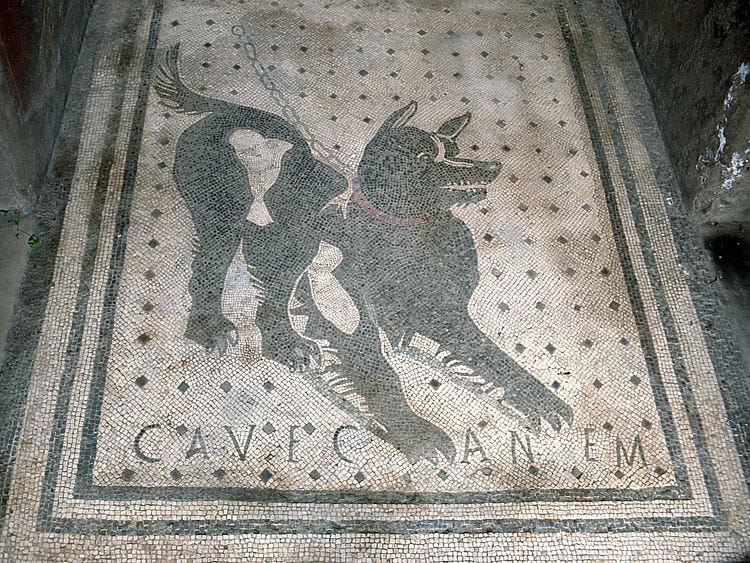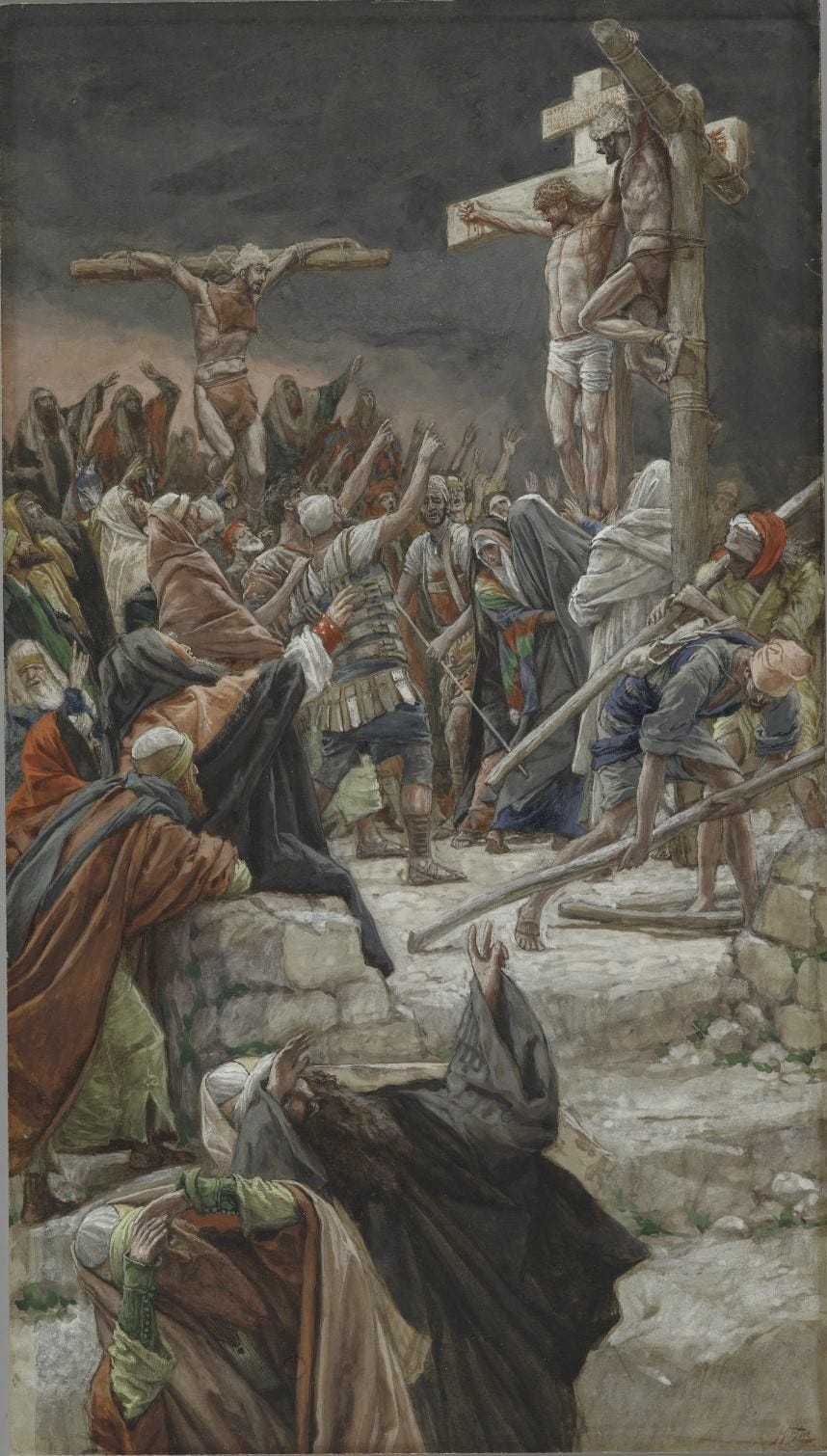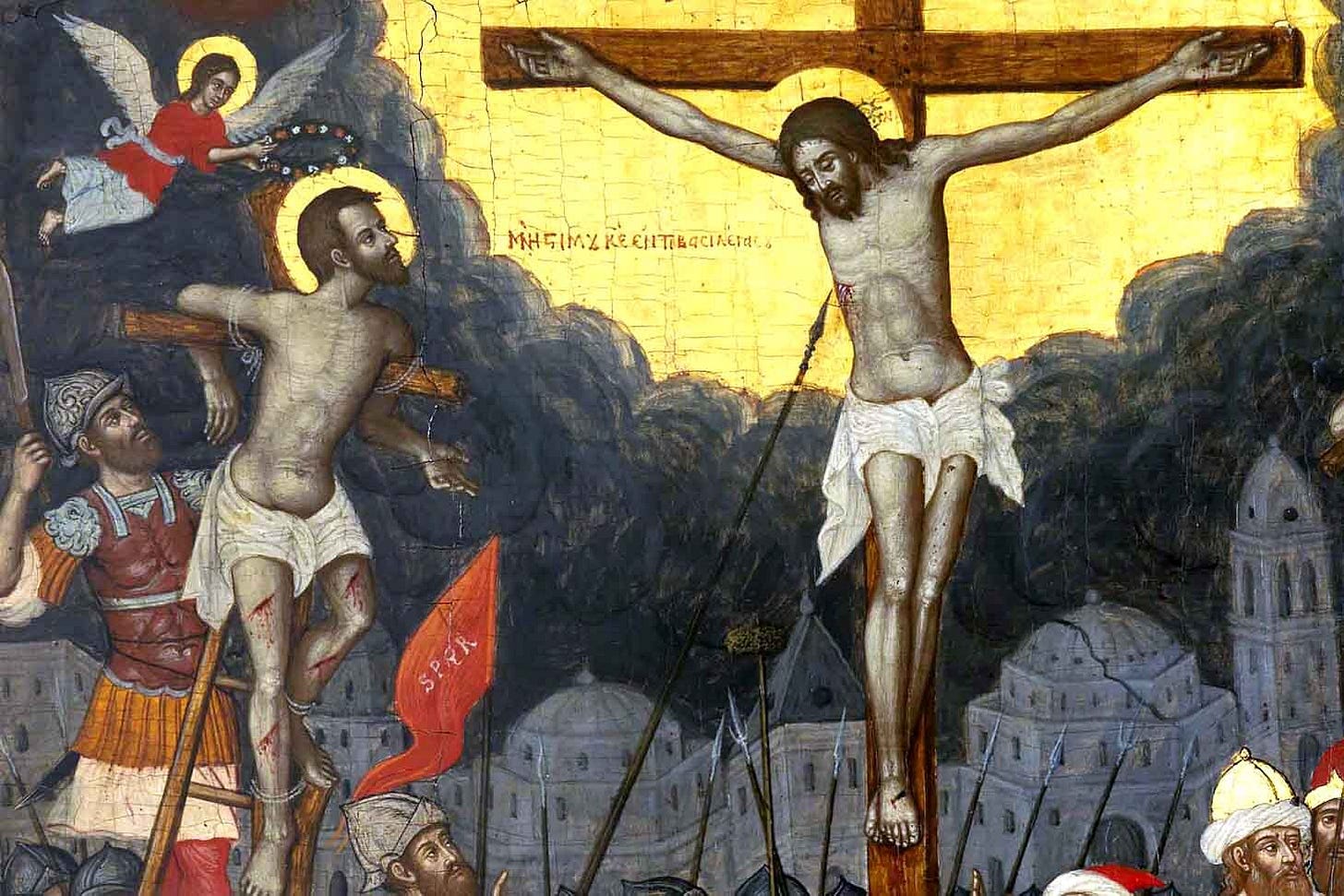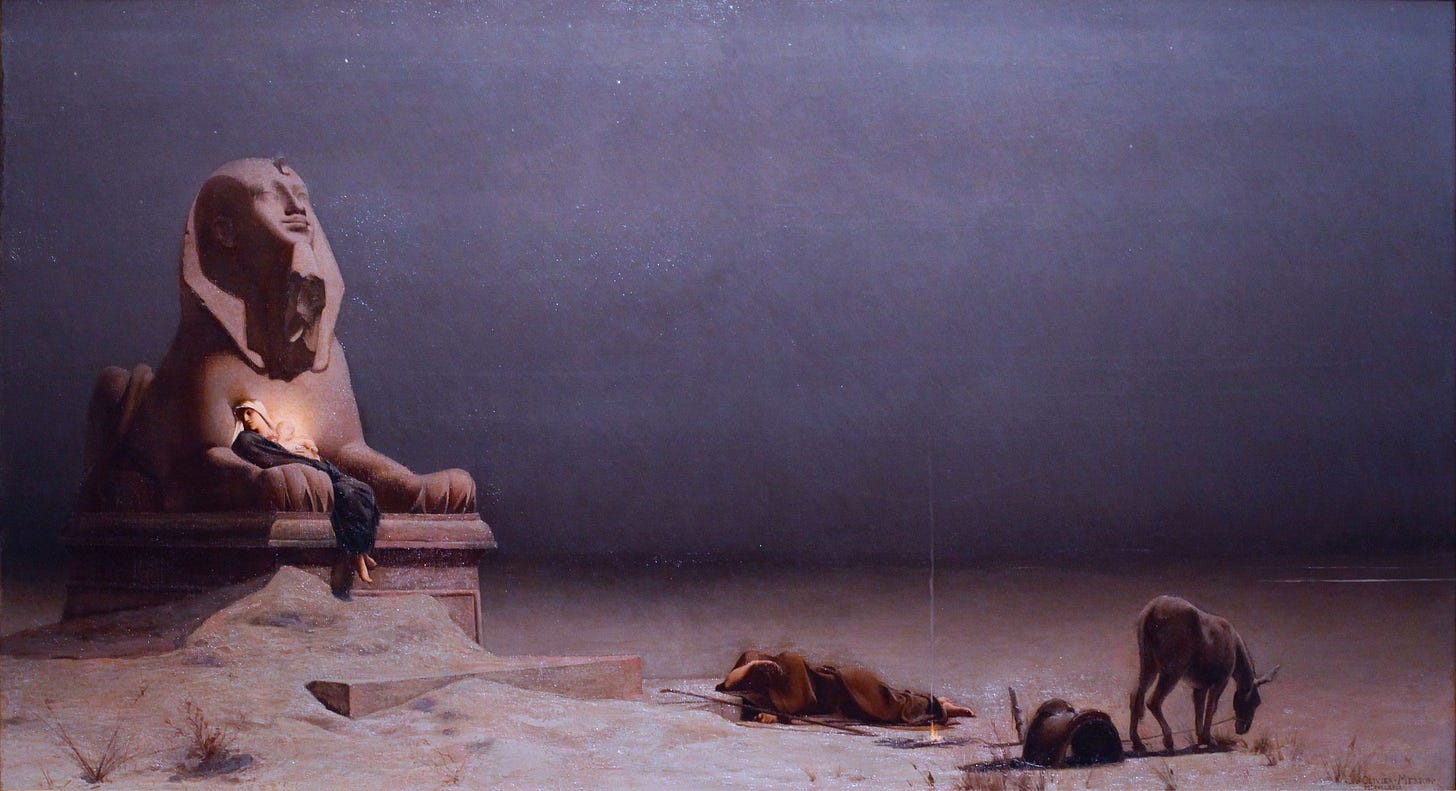Join me today to meet a saint whose life as a robber helped him to enter the kingdom of God.
Name: Dismas, Dimas, Titus, Zoathan, many others
Life: Died 33 AD
Status: Saint
Feast: March 25
You can listen to this as a podcast on Apple Podcasts, Pocket Casts, Spotify or right here on Substack. If you prefer video, you can also follow on YouTube and Odysee (unfortunately, videos may be slower to update).
The angel came to Joseph in a dream, telling him to take his family and get out of Bethlehem. They were in danger. The angel also explained the source of the danger. It was King Herod.
This was bad news. Over his long reign King Herod of Judea had tightened his grip on power and crushed those who opposed him. He was pragmatic, and Herod had made his peace with being a puppet king for Rome. But one of the factions he had to contend with was a simmering insurgency of those who objected to Roman rule in general and to Herod’s rule as a Roman puppet in particular.
These enemies of Herod’s had not yet become the Zealots, the Fourth Philosophy among the Jews. For now, they were insurgents with an ideology. To support themselves, some stole. That is why the historian Josephus sometimes call them robbers, and yet presents them as political fighters. They were a little like the Taliban, or the I.R.A., and like those groups they divided public opinion. Some saw them as freedom fighters, others as a menace to law and order that needed to be wiped out.
On one occasion, these freedom fighter robbers set up a base that they thought even Herod and all his troops could not breach. They were in a cave system in some mountains. In order to get into the caves where the robbers lived with their families, you had to climb down a cliff wall. While you were trying to climb down, you were at the mercy of the people already in the caves, for they could push you and you would fall to your death in the chasm below the cave entrance. But Herod thought about how his Roman patrons would handle the situation, and he came up with a plan.
Herod had his men build a device like a simple crane. The robbers were waiting at the cave entrances to defend their home. But instead of climbers, they saw an armoured box being lowered into the chasm right in front of the cave entrance. Then Herod’s armoured soldiers stood up in the box, facing the robbers in the cave. Herod had equipped his men with long poles tipped with hooks, and they used them to snag nearby robbers and drag them out of their cave to let them drop to their deaths below.
Once the cave entrance was clear, Herod’s shock troops climbed out of the box and fought their way into the cave system. Soon it became obvious to the robbers that there was no hope. One man screamed his defiance at Herod before stepping out of his cave mouth to fall to his death. When they were confident that they had found most of the robbers and their families, Herod’s men started fires inside the cave system and withdrew.
Herod was willing to get his hands dirty, but even so it was impossible to stamp out robbers altogether. The politically motivated robbers were part of a larger problem of crime in the ancient world, and freedom fighters mingled with those who were just in it for the money. Idealism came and went. A few centuries later the Roman Robin Hood, a man named Bulla Felix, Lucky Charm, would thumb his nose at the authorities for a few glorious years while he robbed the rich and helped the poor. But when Bulla Felix was captured and thrown to the wild beasts, his six hundred followers scattered, and those who came after him were in it for the money once again.
Those less idealistic robbers were everywhere in the Roman Empire. If you travelled with a large escort of soldiers the robbers would stay out of sight. But they were watching. They kept an eye on choke points on the road. Robbers also disguised themselves as ordinary travelers, starting up a conversation to figure out who had something worth stealing. Large groups of robbers burst into large homes to steal whatever they could find. Sometimes robbers became so powerful and numerous that they would take over entire villages and operate until the Romans dispatched troops to deal with them. When the philosopher Epictetus was trying to illustrate the nature of inevitability, he pointed to the way that travelling made it inevitable that you’d have to worry about robber attacks.

Still, King Herod was more frightening than the robbers along the roads. Joseph had no trouble believing that Herod would kill a boy. Actually, Herod was already famous for doing so, having killed some of his own children. One Roman emperor who knew Herod wryly observed that, given Jewish dietary laws and Herod’s violent nature, it would be safer to be Herod’s pig than Herod’s son.
All of this can help us to understand what Joseph did after his warning by the angel. For now Joseph had to figure out how to bring his family to Egypt.
The easy way to get to Egypt was to travel to the port of modern Jaffa and take a boat. The trouble was that this would require the Holy Family to walk most of the way East to West across the middle of the modern state of Israel. They would be exposed to Herod’s men or his spies that whole time. Then there would be a delay at Jaffa as Joseph tried to find a captain willing to take them on for whatever small savings Joseph could afford to pay. No, it was too dangerous.
That left the second, slightly less dangerous alternative: face the robbers on the long walk West and South into Egypt. The way to mitigate that danger was to travel in the dark. Joseph’s plan was that they would move along quietly and not be noticed. But according to an ancient tradition in the apocrypha, this precaution would prove insufficient.
As they came toward Egypt, the Holy Family approached a pass into the desert, and even someone as law-abiding as Joseph could see that it was the perfect place to set up an ambush. And so Joseph waited until it was very dark to bring Mary and Jesus very quietly through the pass and into the open country beyond.
As Joseph had suspected, there were robbers there, a large group of them. Most of them were asleep, but they had posted two men to keep watch, a younger man and an older one. As the Holy Family tried to slip through the pass, the watchers spotted them, swiftly assessing the situation. Joseph might not be rich, but he was probably carrying most of what he owned with him. This family was worth robbing.
But then something unusual happened. The younger robber - his name is variously preserved as Dismas, or Titus, and other names besides - realized that for some reason he didn’t want to rob these people. Quietly, so as not to awaken the main robber force who were asleep nearby, Dismas began to try to convince his companion not to sound the alarm.
The older robber, sometimes called Gestas although he too has many names, was determined to get his money. He was going to wake up the others. And so Dismas made him a better offer. Dismas would pay Gestas to stay quiet, 40 drachmas, more than a month’s wages. And, since they were both robbers after all, to prove that he was serious, Dismas gave the older robber his belt as surety. Beyond their usefulness, belts were expensive and could be signs of status. Dismas would be missing his until he paid the money he owed.
For the older robber Gestas, this was easy money. He could rouse the others and get a small share of whatever was in Joseph’s pockets. Or he could sit back and make 40 drachmas from his idealistic young companion for doing absolutely nothing. He chose the easy way, and the Holy Family passed by.
At some point, Mary and Joseph realized they were being watched. When it became clear that they were being allowed to pass in silence, the apocryphal story is that Mary blessed the robbers as they passed. But the young Jesus did not bless them. Instead, He leaned over and quietly told his mother such a terrible thing about the future in which He and these robbers would meet again that Mary burst out, “God forbid!”
The Holy Family went on their way into Egypt. Back in Judea, Herod grew very sick. He was dying. It was an ugly way to go, with maggots breeding in his body even before he was dead. Herod suspected that few would miss him, so he ordered that on the day of his death a group of well-liked citizens would be slaughtered to ensure that there was general mourning. But Herod’s heirs didn’t miss him either, and they cancelled his plans.
With Herod gone, the Holy Family returned from Egypt. Jesus grew up, and began His ministry.
Over these years, things did not go well for the idealistic robber, Dismas. He was living a dangerous kind of life, surrounded by violent men, and tradition has it that as the years passed his idealism began to fade. The cynicism and callousness of the older robber, Gestas, began to rub off on Dismas. Perhaps Gestas never let Dismas forget the day he had gone into debt to not get paid, and eventually Dismas came to believe that he had been a fool. If Dismas had begun with political ambitions, he had lost them by now. He was just a robber, trying to get rich, and he did things of which he was ashamed.
And then, around the time when Jesus was leading the disciples back to Jerusalem for Passover, luck ran out for Dismas and Gestas and they were captured. In the ancient world robbers lived violent lives and were violently punished. In fact, there was so much punishment to do that third party contractors advertised cut-rate punishment services to take the pressure off busy officialdom. Possible punishments included flogging, being thrown to wild animals in an arena, enslaved in a mine, or being crucified.
For Dismas and Gestas, the punishment would be the cross. But the Jewish authorities, in some traditions, recognized that Dismas and Gestas could serve a secondary purpose. The authorities were already working with a mole inside Jesus’ inner circle: Judas. The authorities decided to keep Dismas and Gestas in lockup until Jesus was handed over to them.
And so on March 25th - for this is a traditional dating of Good Friday - Jesus and the two robbers were to be executed together. It was a subtle piece of narrative framing. Jesus wasn’t a robber, obviously. But the juxtaposition was meant to make you think. So many robbers had gone into their profession with good intentions, intending to change the world, and ended up as jaded thugs like Dismas and Gestas. Onlookers were meant to ask themselves whether this radical teacher, Jesus, might not prove a danger as well.
When Jesus was placed on the cross, Dismas and Gestas were crucified along with Him. And if the apocrypha can be believed, Mary, watching the crucifixion, must have remembered what the child Jesus had told her all those years ago in the desert, that one day He would hang on a cross, with these two robbers to His left and right.
Did Dismas remember that the man beside him was the boy of the family he had paid to protect years earlier? Maybe. But a tradition that I find more interesting suggests that perhaps he did not need to. Dismas’ idealism had long ago been worn away. Instead, he had acquired the skill set of a robber. Violence didn’t shock him. He had the ability to think clearly in painful and stressful situations. And most of all, he had developed a kind of sixth sense to know when someone had something valuable. These skills made Dismas good at being bad.
And yet, facing death on the cross, it was precisely these skills that Dismas found he needed. The violence and chaos and shouting didn’t stun Dismas: he could tune such things out. The pain of dying on the cross was terrible, as his muscles spasmed and he was asphyxiated, but Dismas could think even in stressful situations. And the internal alarm that let him know when there was something valuable to be had was ringing louder than it ever had and pointing him to Jesus being crucified beside him.
At the end of a life that had gone bad, Dismas realized that in a twist of grace, his bad qualities were lined up to give him a last chance at redemption. Perhaps, for a moment, he thought about the idealistic young man he had once been. That man was gone. But here at the end of life, Dismas the robber had one last prize to snatch.

And so Dismas tuned out the shouting and the pain and mockery, focused, and prepared his confession and his request, speaking first to the older man who had led him into a life of crime who was joining in the general abuse of Jesus.
“Have you no fear of God, for you are subject to the same condemnation? And indeed, we have been condemned justly, for the sentence we received corresponds to our crimes, but this man has done nothing criminal.”
Then he said, “Jesus, remember me when you come into your kingdom.”
He replied to him, “Amen, I say to you, today you will be with me in Paradise.” (Luke 23:40-3)
If you enjoy the Manly Saints Project, please consider signing up for a subscription on Substack, or click here or on the logo below to buy me a beer.








Great writing. 👍🏽